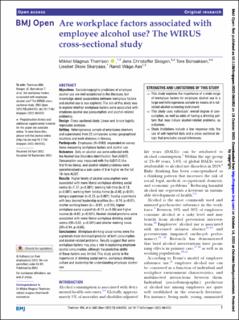| dc.contributor.author | Thørrisen, Mikkel Magnus | |
| dc.contributor.author | Skogen, Jens Christoffer | |
| dc.contributor.author | Bonsaksen, Tore | |
| dc.contributor.author | Skarpaas, Lisebet Skeie | |
| dc.contributor.author | Aas, Randi Wågø | |
| dc.date.accessioned | 2022-11-03T10:25:28Z | |
| dc.date.available | 2022-11-03T10:25:28Z | |
| dc.date.created | 2022-09-30T13:21:26Z | |
| dc.date.issued | 2022 | |
| dc.identifier.issn | 2044-6055 | |
| dc.identifier.uri | https://hdl.handle.net/11250/3029824 | |
| dc.description.abstract | OBJECTIVES: Sociodemographic predictors of employee alcohol use are well established in the literature, but knowledge about associations between workplace factors and alcohol use is less explored. The aim of this study was to explore whether workplace factors were associated with employee alcohol use (consumption and alcohol-related problems). DESIGN: Cross-sectional study. Linear and binary logistic regression analyses. SETTING: Heterogeneous sample of employees (workers and supervisors) from 22 companies across geographical locations and work divisions in Norway. PARTICIPANTS: Employees (N=5388) responded on survey items measuring workplace factors and alcohol use. OUTCOMES: Data on alcohol use were collected with the Alcohol Use Disorders Identification Test (AUDIT). Consumption was measured with the AUDIT-C (the first three items), and alcohol-related problems were operationalised as a sum score of eight or higher on the full ten-item AUDIT. RESULTS: Higher levels of alcohol consumption were associated with more liberal workplace drinking social norms (b=1.37, p<.001), working full-time (b=.18, p<.001), working from holiday home (b=.40, p<.01), being a supervisor (b=.25, p<.001), having supervisors with less desired leadership qualities (b=-.10, p<.01), shorter working hours (b=-.03, p<.05), higher workplace social support (b=.13, p<.05), and higher income (b=.02, p<.001). Alcohol-related problems were associated with more liberal drinking social norms (OR=3.52, p<.001) and shorter working hours (OR=0.94, p<.05). CONCLUSIONS: Workplace drinking social norms was the supremely most dominant predictor of both consumption and alcohol-related problems. Results suggest that some workplace factors may play a role in explaining employee alcohol consumption, although the predictive ability of these factors was limited. This study points to the importance of drinking social norms, workplace drinking culture and leadership for understanding employee alcohol use. | en_US |
| dc.description.abstract | Are workplace factors associated with employee alcohol use? The WIRUS cross-sectional study | en_US |
| dc.language.iso | eng | en_US |
| dc.rights | Navngivelse 4.0 Internasjonal | * |
| dc.rights.uri | http://creativecommons.org/licenses/by/4.0/deed.no | * |
| dc.subject | Alcohol | en_US |
| dc.subject | Workplace factors | en_US |
| dc.subject | employee alcohol use | en_US |
| dc.subject | Workplace drinking | en_US |
| dc.subject | social norms | en_US |
| dc.subject | consumption | en_US |
| dc.subject | workplace drinking culture | en_US |
| dc.title | Are workplace factors associated with employee alcohol use? The WIRUS cross-sectional study | en_US |
| dc.title.alternative | Are workplace factors associated with employee alcohol use? The WIRUS cross-sectional study | en_US |
| dc.type | Peer reviewed | en_US |
| dc.type | Journal article | en_US |
| dc.description.version | publishedVersion | en_US |
| dc.subject.nsi | VDP::Samfunnsvitenskap: 200 | en_US |
| dc.source.journal | BMJ Open | en_US |
| dc.identifier.doi | 10.1136/bmjopen-2022-064352 | |
| dc.identifier.cristin | 2057222 | |
| dc.relation.project | Norges forskningsråd: 260640 | en_US |
| dc.relation.project | Universitetet i Stavanger: IN-11551 | en_US |
| cristin.ispublished | true | |
| cristin.fulltext | original | |
| cristin.qualitycode | 1 | |

